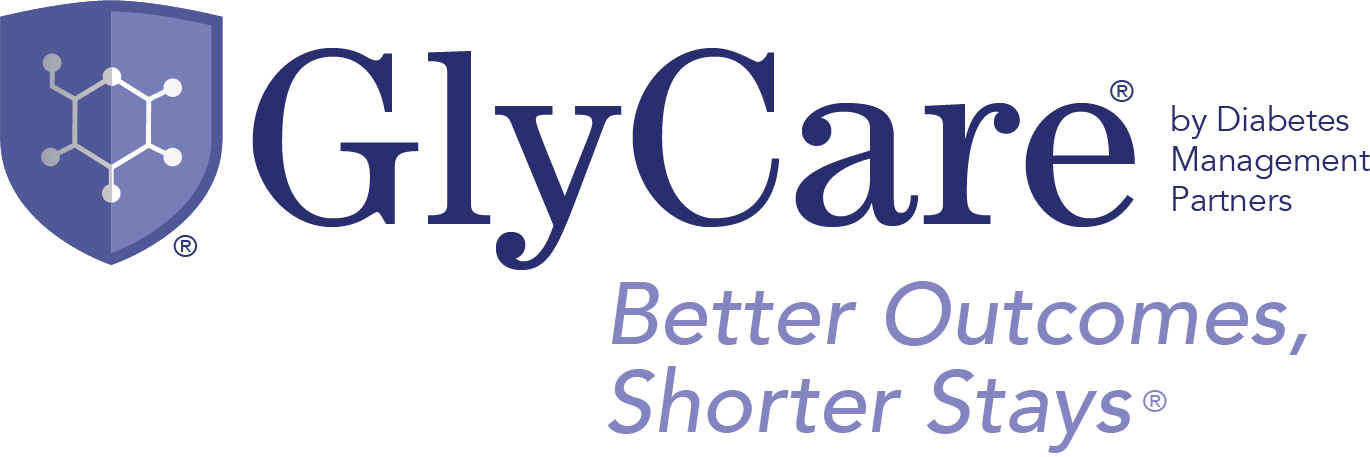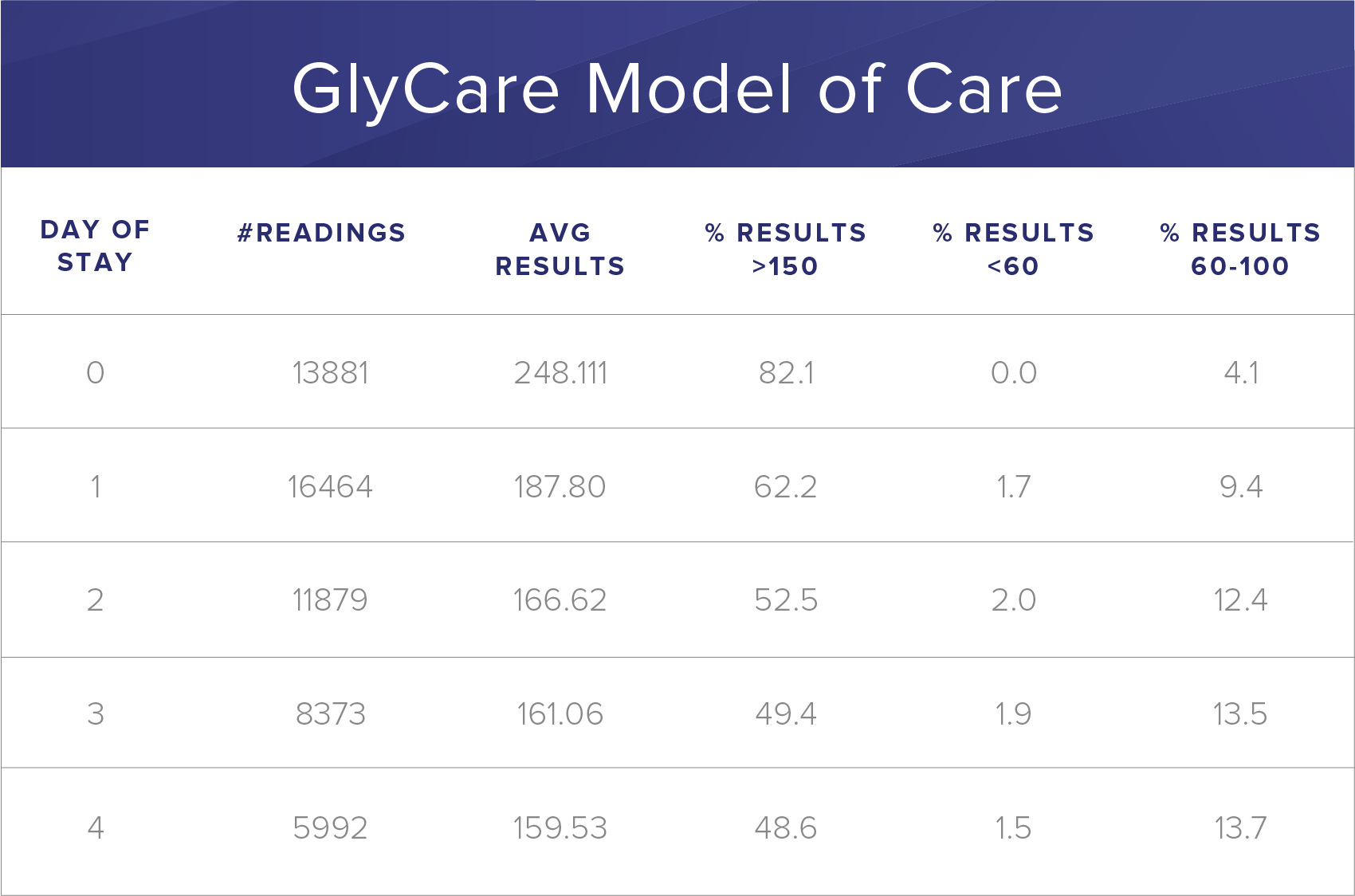
Working Together to Eliminate Diabetic Complications
Sustainable care improvements through a Glycare-facility partnership
GlyCare® revolutionizes diabetes care in healthcare facilities with its specialized inpatient diabetes management program and dedicated rounding service.
GlyCare’s Impressive Success Rate
↓ 1.69 days
Length of stay reduced by 1.69 days
↓ 80%
ER visits for severe hypoglycemia
within 30 days of discharge down > 80%
↓ 30%
Readmission rate down > 30%
↓ 35%
Hypoglycemia during hospital
stay down by 35%
↓ 80%
Transfer to ICU for insulin drip down > 80%

The GlyCare® Advantage
Population Management.
Care is standardized across departments and personnel, promoting a safe and seamless transition for diabetes patients both within the hospital and upon their discharge. GlyCare prioritizes preventive measures rather than reacting to blood sugar irregularities after they occur.
Turn-Key Solution.
GlyCare’s approach translates American Diabetes Association (ADA) inpatient guidelines into clinical practice across all departments, units, and personnel. This step-wise intervention is implemented without incurring additional costs to your facility.
Industry Experts.
Our team of industry experts bridges the gap between research and practical implementation, providing solutions that align with evolving clinical guidelines and the latest technological advancements.
Stay ahead of the curve with our tailored services, designed to keep you on top of the rapidly expanding knowledge base in inpatient diabetes care and glycemic management. Partner with us to optimize outcomes and elevate patient care.
Endocrinology Oriented Care
Over the last decade, the medical literature has shown that organized, standardized diabetic management under direct Endocrine supervision improves outcomes when implemented at major teaching hospitals across the country.

Helping hospitals help patients
Our proven outcomes have dramatically improved glycemic control. As a result, serious adverse events related to medical errors were eliminated under our supervision. Additionally, we reduced the average length of stay, readmission rates, and complications. This translates to millions of dollars saved by hospitals and patients.
System-Wide Advantages of a GlyCare Partnership.
Proactive Strategy
Our focus is on a timeframe measured in hours, not days. This methodology enables us to intervene swiftly and early, acting as the driving force behind hospital-wide population management. Our collected data has demonstrated rapid and remarkable outcomes.
Workflow optimization
Our team will augment nursing and Hospitalists by taking over glycemic management responsibilities from admission through discharge. We standardize care across departments and personnel. We make available our proprietary, interactive dashboard that reports on KPIs using data directly sourced from your EMR.
Going beyond surveillance
Daily Root Cause Analysis is undertaken by our team for all hyperglycemic events (BG>300 mg/dL) and hypoglycemic events (BG<40 mg/dL). This focuses on continuous improvement, helping to minimize the risk of avoidable complications and serious safety events (SSE).
Speed, simplicity, scalability
Our approach will reduce the nonbeneficial variations in clinical practice and spend. Our unique value is that we specifically focus on diabetes and glycemic control, delivered through Nurse Practitioners that are hired, trained, managed and supervised by GlyCare. We bill fee-for-service at the midlevel reduced rate.
Patient Glucose Results Comparison
Data from July-November 2016. *Filtered to patients with at least one BG > 200 on Day Zero
Frequently Asked Questions
-
GlyCare's service is a programmatic, evidence-based population management service comprised of teams of Nurse Practitioners specifically trained for inpatient diabetes and glycemic management.
Our practitioners manage approximately 25% to 30% of the facility's bed count daily, translating to around 40 to 100+ patients daily. Notably, these patients are admitted for various reasons unrelated to diabetes. Therefore our providers are focused solely on glucose control.
The way we approach glucose management for hospitalized patients is different due to dietary intake, medications, and procedures. These things would not exist for the patient in an outpatient environment. GlyCare assesses the patient under these conditions, actively manages and enhances diabetes care throughout the patient's hospital stay, and facilitates the discharge process and medication reconciliation. With GlyCare on the case, it frees up the other providers to focus on the patient's other needs. Additionally, GlyCare's program aims to produce consistency and standardize inpatient diabetes management throughout the facility.
-
Yes. Treatment is adjusted based on clinical characteristics, including severity of illness, hyperglycemia, the presence of complications, and treatment before admission. The preferred treatment for noncritically ill patients with poor oral intake or who are NPO is basal insulin plus bolus correctional insulin (ADA, 2024). The preferred treatment for noncritically ill patients with good nutritional intake is basal, prandial, and correctional insulin (ADA, 2024).
DPP-4 Inhibitors are the only oral medications GlyCare will utilize in the inpatient setting. DPP-4 Inhibitors alone or combined with basal insulin have shown to be well tolerated in the inpatient setting (ADA, 2024) and effective with minimal side effects (Pasquel et al., 2017; Umpierrez et al., 2013), making it the safest oral medication for use in the hospital setting.
-
Our team of practitioners oversees approximately 25% of the facilities bed count daily. Our focus is on maintaining glycemic levels for all adult patients with diabetes and patients with episodes of hypo/hyperglycemia. We round on med-surg and stepdown units, excluding Intensive Care Units unless consulted for glycemic control. Typically, our services would resume once the patient transitions back to the floor. GlyCare does not provide services to patients who are being discharged within 24 hours.
-
Our program is structured to foster collaboration with local endocrinologists for paid supervisory arrangements. We understand the critical role that endocrinologists play in patient care, and it is important to emphasize that GlyCare's services are designed to complement rather than detract from their responsibilities.
Our practitioners manage approximately 25% to 30% of the facility's bed count daily, translating to around 40 to 100+ patients daily. Notably, these patients are admitted for various reasons unrelated to diabetes, suggesting that a significant portion of them would not typically fall under the care of an endocrinologist. By allowing GlyCare to handle glycemic control for a subset of patients, it enables rounding endocrinologists (and Hospitalists) to concentrate their expertise on individuals with more complex health needs and the reason for admission. This strategic division of labor ensures that each patient receives the specialized attention they require, ultimately leading to improved outcomes across the board.
Hospitalists and/or rounding Endocrinologists will continue to oversee glycemic management for patients in critical care units, pediatric patients, obstetrics, and gynecology patients. This ensures that specialized care is provided where it is most needed, while GlyCare focuses solely on glycemic control for the broader patient population.
-
The program incurs no costs to the facility; we provide treatment to all patients, regardless of their ability to pay, without seeking subsidies. Our team will enhance the capabilities of your clinicians by leveraging the expertise and support provided by GlyCare. This strategic decision involves reallocating expenses related to staffing, payroll, and benefits to GlyCare. Our unique value is that we specifically focus on diabetes and glycemic control, delivered through Nurse Practitioners. We bill fee-for-service at the midlevel reduced rate. We are responsible for overhead like payroll and benefits.
-
GlyCare's program is a pivotal initiative in driving patient safety and quality through standardized glycemic management practices.
Teaching facilities can benefit in two significant ways:
The nursing segment is essential for ensuring patient safety and quality care. GlyCare's program ensures consistency and standardization of care across departments, units, and personnel. By identifying preventable glycemic events, nurses can receive targeted education, and nursing protocols can be more effectively enforced.
The number of physician residents transitioning to inpatient medical practice varies by year and specialty. For instance, family medicine residency graduates have shown a decline in providing inpatient care, with only 46% reporting such practice in recent years compared to 68% previously. This trend indicates a shift toward other practice settings or outpatient care for many residents (AAMC, American Medical Association). Leveraging GlyCare's expertise will standardize glycemic management practices, improving patient outcomes and ensuring consistent care delivery. Collaborating with residents and interns enhances their educational and clinical learning experiences and fosters a multidisciplinary approach to patient care. This comprehensive strategy ultimately leads to improved patient outcomes and a more cohesive healthcare environment.
-
No. GlyCare providers take a team approach, working hand-in-glove with physicians, nursing, dietitians, case managers, diabetes educators, and discharge planners to maximize glycemic control for the patient's benefit. Outside of glycemic management, the ongoing physician interactions will remain with the hospitalist or community physician on the case.
-
By leveraging the expertise of GlyCare practitioners to handle the glycemic management of their patients, internal medicine doctors can dedicate more attention to other crucial aspects of patient care and medical decision-making. This delegation of responsibilities can significantly alleviate their workload, enabling them to offer more comprehensive and attentive care to all patients under their supervision. Further, GlyCare's presence produces consistency and standardized care across departments and personnel, minimizing unfavorable variations in the clinical practices of glycemic management. With the support of GlyCare's specialized knowledge and skills, internal medicine doctors can confidently ensure that their patients receive top-notch care, leading to heightened patient safety and overall satisfaction with the healthcare experience.
-
No, GlyCare providers are specially trained by board-certified endocrinologists in inpatient glycemic management. This service is a population management program focused on comprehensive glycemic care. In facilities with rounding endocrinologist(s), GlyCare's service will free them up to concentrate on patients with more complex health needs as GlyCare focuses solely on glycemic control. Hospitalists and or rounding endocrinologists will continue to handle glycemic management for patients in the ICU, pediatric patients, obstetrics, and gynecology patients. Endocrinologists desiring to engage in a paid collaboration with GlyCare are welcomed.

Arrange for a Discussion
Interested in partnering with GlyCare? Together we can eliminate unnecessary diabetic complications. Let’s continue to move forward providing better care.





